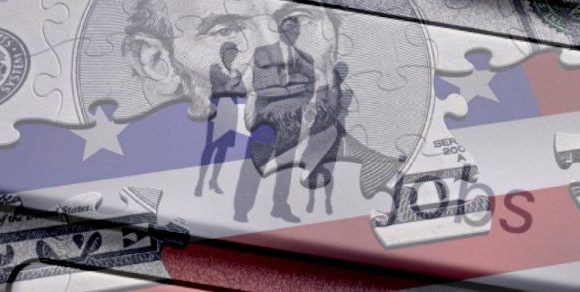UA economist: Chances for U.S. recession this year are low
by June 8, 2023 5:25 pm 1,244 views

It may feel like a recession in some respects when consumers stock up on groceries, pay their rent or book airfare, but Mervin Jebaraj said odds are the economy will not tip into a recession this year.
Jebaraj, executive director for the Center of Business & Economic Research at the University of Arkansas, made that prediction Thursday (June 8) at the organization’s quarterly business analysis luncheon held at the Hilton Garden Inn event center in Fayetteville. He said as long as the national job market continues to show strength and consumers and businesses keep spending, the U.S. could stave off recession indefinitely.
A caveat to that prediction would be some major shock to the economy. He said averting the government shutdown and debt ceiling crisis was a major plus factor in his positive prediction.
He said the U.S. economy is full of contradictions. He said personal consumption expenditures adjusted for inflation remain strong into the second quarter despite the continued shift away from goods toward services.
Inflation is stubborn and taking its time to come down to the targeted goals of 2% by the U.S. Federal Reserve. Jebaraj said the rate of price increases is slowing, but shelter, food, new and used cars and travel costs remain elevated with no sign of moderating. He does not see the Fed’s core inflation indicator (excluding food and fuel) being achieved this year.
Higher interest rates continue to slow the residential housing market and commercial lending. Jebaraj said he expects rates to increase one more time by the end of summer to between 5.25% and 5.5%. He does not necessarily think the Fed will raise rates at the next meeting slated for June 13-14 but perhaps defer to later in the year.
Higher interest rates might take a toll on the sales of large ticket items like homes and cars, but Jebaraj said the strong job market and somewhat higher wages for non-office jobs have consumers spending.
“Everyone who wants a job has one, and we have the highest labor participation rate in 25 years with women leading the way. … 78% of women between the ages of 25 and 54 have returned to the workforce. The one area there is softness in the employment market is with fewer job openings,” he said.
With respect to Northwest Arkansas, Jebaraj said the 2.1% unemployment rate essentially means full employment. He said the highest Arkansas rate in Pine Bluff at 4% is a record low for that metro area. Other metrics at work in Northwest Arkansas are rising home prices due to supply and demand. At $430,000, the average home price coupled with 6.5% mortgage rates is pricing people out of the market. He said apartment rents are also high averaging $926 per month to start this year, and there is no sign of relief given low vacancy rates in the metro.
Another area of concern is the somewhat still fragile banking industry that is holding on to commercial real estate and other development loans. Phillip Knight, president of Bankers Capital Funding, told Talk Business & Politics it’s getting harder to get banks to make new loans that they would have jumped at a year ago.
“Credit has tightened in recent months given the uncertainty around the possibility of weaker balance sheets and heightened regulation that will have a ripple effect throughout the economy,” Knight said. “There is no shortage of banks in this area, but they are all chasing very limited pristine credit and fewer overall deals.”
Even with a weaker banking sector, Jebaraj said, the positives still barely outweigh the negatives in the local, state and national economies for now. He is not totally ruling out a recession but said the earliest prediction would be around early 2024.
